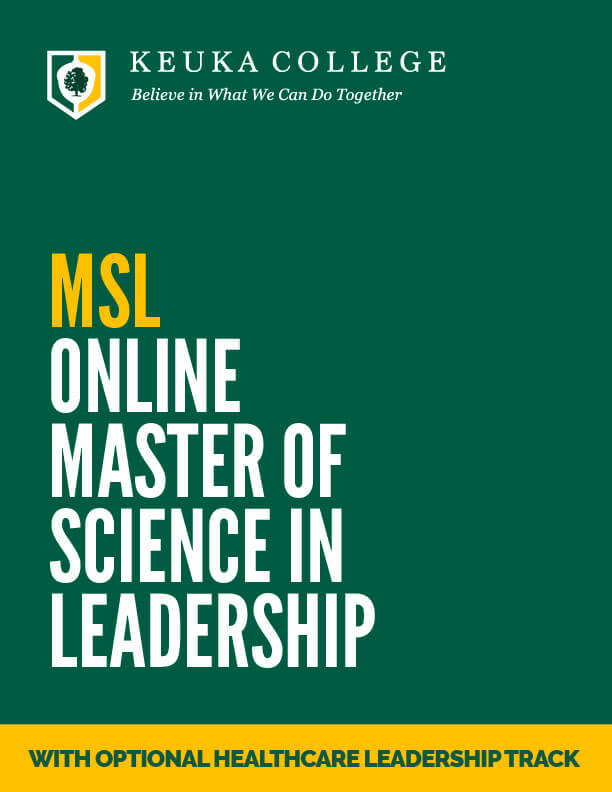
Master of science in leadership
Take Your Career
to the next level.
Gain the leadership skills and confidence to climb the corporate ladder, start your own business, or drive positive change in the healthcare field.


Gain the leadership skills and confidence to climb the corporate ladder, start your own business, or drive positive change in the healthcare field.


Complete your coursework online at your convenience.
Earn your master’s degree in under two years.
Lead with purpose in Management or Healthcare.
You’ll be part of a cohort and campus community that’s small on purpose and ready to provide one-on-one guidance every step of the way.
You’ll be part of a cohort and campus community that’s small on purpose and ready to provide one-on-one guidance every step of the way.
Since our founding, Keuka College has been committed to creating exemplary citizens and leaders to serve the nation and the world.
Our core MSL curriculum is designed for working professionals who aspire to be tomorrow’s changemakers in a broad range of sectors and settings.
Taught by skilled instructors with extensive industry experience, your courses will cover vital topics like business ethics, finance, marketing, and human capital management.
500,000+ medical management positions will be created over the next decade. With an MSL focusing on healthcare, you’ll be ready to step into a high-impact role.
In addition to your foundational coursework in management principles and practice, you’ll take a specialized course sequence led by experienced healthcare professionals.
Our flexible and experiential MSL program comprises 10 courses designed for busy professionals who aspire to be tomorrow’s changemakers.
Keeping costs low is important to us. At just $802/credit – with the option to transfer in credits earned elsewhere – your MSL degree is within reach.
We always aim to open doors to opportunity – not create extra barriers to entry. Review our admissions requirements and find out how to apply.
If there’s one word that sums up the benefits of earning your MSL at Keuka College, it’s possibilities. Our graduates go on to a wide range of meaningful, well-paying careers, like:
$128,000: median salary in upstate NY
$111,000: median salary in upstate NY
$103,000: median salary in upstate NY
$148,000: median salary in upstate NY
$153,000: median salary in upstate NY
For over 130 years, Keuka College has earned a stellar reputation for educating leaders across the Finger Lakes region and beyond.

Medical Staff Director, Cayuga Health
My education at Keuka College has proven invaluable as I have focused on building a strong team and promoting growth and resilience in an evolving landscape.

Owner, Melody’s
Keuka College gave me a perspective that I didn’t have before, and an opportunity to exercise, share, and test what I know.

CEO, YWCA of Rochester & Monroe County
I had a demanding full-time job, and I was married with four kids. Keuka College’s program checked all the boxes.

Patricia is passionate about helping students achieve their educational and professional goals. She can answer any questions you may have about the MSL program and guide you through the admissions process.
Phone: (315) 505-2294
Email: ppalacios@keuka.edu

As chair of the Division of Business and Management at Keuka College, Megan Lawson Clark is responsible for shaping our industry-responsive curriculum and student-centered culture. She earned her MBA from SUNY Oswego, her MA in Design from Syracuse University, and her BA in Fashion Design from Dominican University.
Prior to her academic career, she worked in visual and retail management for major national brands, and she expertly integrates that industry experience into her research and classroom instruction. Prof. Clark’s current courses include Organizational Behavior and Human Resource Management. She also serves as an advisor to Management students engaged in hands-on learning experiences.
Email: mlawsonclark@keuka.edu

Mark McNaney, assistant professor of Business Administration at Keuka College since 2015, brings extensive healthcare administration experience to his instructional role. He has held leadership positions at the University of Rochester’s Medical Center and School of Nursing, the SUNY Upstate Medical Center, and Finger Lakes Health.
An upstate New York native and an adult learner, he earned an MA in Health Systems Leadership from the University of Rochester and a BS in Accounting from Elmira College. At Keuka College, he teaches an array of in-demand topics at both the graduate and undergraduate levels, including Accounting for Managers and Marketing to Global Audiences.
Email: mmcnaney@keuka.edu
Schedule an individual appointment with an advisor to find out more about the admissions process, program details, and anything else you’re curious about.
A specialized graduate degree focusing on strategic thinking, ethical leadership, and effective management skills. Keuka College’s MSL empowers you to guide teams, foster innovation, and drive positive change in business, nonprofit, and healthcare settings.
We combine practical learning, small class sizes, and personalized support for busy adults. With 130+ years of academic excellence, we offer flexibility, expert faculty, and strong industry connections to help you thrive.
An MSL emphasizes leadership, team development, and change management, while an MBA focuses on finance and operations. Keuka College’s MSL can be completed faster, requires no GMAT/GRE, and offers an optional Healthcare Leadership track.
You’ll be prepared for roles such as Healthcare Administrator, Management Analyst, Marketing Director, or Benefits Manager. These positions leverage leadership and strategic planning to guide organizational success.
Yes. All coursework, discussions, and assignments are completed remotely, allowing you to balance your studies with work and family commitments. You can also visit our Finger Lakes campus for optional networking opportunities.
Tuition is $802 per credit for 31 credits, totaling about $24,862. We’ll help you explore external scholarships, grants, employer tuition remission, and military benefits. Our financial aid counselors will help you explore your options.
Most students finish in around 21 months by taking one course at a time. This streamlined schedule accommodates working professionals seeking a graduate degree without putting their lives on hold.
No. A bachelor’s degree and a 3.0 GPA are our main requirements. You don’t need a business background or GMAT/GRE scores to apply.
Yes. We review graduate-level coursework for possible transfer. Our enrollment counselors will work with you to maximize any eligible credits and reduce your completion time.
You’ll have access to academic tutoring, 24/7 online library services, tech support, and a dedicated Student Support Specialist. Professors are also accessible via email and virtual office hours.
A reliable computer with internet is essential to access Moodle, our learning management system. Our digital support team can assist with software or hardware questions.
Complete our online application and submit your transcripts. Keuka College offers rolling admissions, and an admissions counselor will guide you through financial aid, transfer credit evaluations, and next steps.

The MSL program’s streamlined format enables busy professionals to take one course at a time and finish in under two years.
This course will engage students in a critical examination of the changing nature of work and organizational conditions that create new challenges relating to the skills of business leaders. In addition to skills, development in the areas of goal setting, problem solving, and communications, this course will include assessment of personal leadership styles, decision-making and the capacity to function as an organizational change-agent. The ability to lead others through change will be the central theme of the course.
This course deals with morality in the business environment. It will deal with the centrality of ethical values to the individual and the organization, scope of the moral responsibilities of corporations, and ethical choices pervasive in management in the 21st century.
This course is designed to provide applied competence in accounting and finance in the management of business organizations. The focus in on both how accounting measures can be used to promote efficient allocation of resources, and the ability to evaluate the business financing decisions in relation to their objectives. A case study approach will be taken.
This course emphasizes the principles of economic theory which are essential to effective management decision-making. It reviews the fundamental principles of micro-economic and macro-economic theory. The focus is on: consumer demand; the nature and behavior of costs; the operation of markets; monetary theory and policy; financial institutions; employment and unemployment; capital formulation; and economic growth. A case study approach will be taken.
This course will focus on providing students with the wherewithal to conceptualize and develop an organization-wide marketing plan. The case-studies approach is designed to develop the necessary skills essential in making tactical and strategic marketing decisions.
This course introduces the student to the skills necessary to think strategically about business decisions regarding the ability to attract, employ, develop, motivate, engage, and retain strategically relevant talent. This course presents the importance of aligning human resources with overall corporate strategy to establish a competitive advantage. Understanding human capital needs is a primary drive for business success. The course will focus on the current areas: understanding individual differences in the workplace; motivating and measuring performance; best practices in developing talent; how to engage the workforce and evaluate the culture; understanding the challenges in managing a global workforce.
This course provides non-lawyer managers an overview of state and federal government regulatory agencies and regulations, intellectual property rights, contracts and tort laws, as it applies to businesses. Emphasis on liabilities issues.
The study of the legal impact of the various social institutions on international managers. The study of the role of culture, education, and politics in shaping attitudes toward work and leisure. The study of the role of discipline and motivation in different cultures.
This course introduces the student to the field of business analytics and an overview of data and information management. The topics covered in this course will include the following: the use of data warehouses, dashboards, key performance indicators, and data mining for making business decisions; an introduction to computer programming and computational thinking; an overview of information systems, their purpose, and their importance to international organizations. Computational thinking will introduce the student to the fundamental concepts of computer science used in problem solving, which include understanding human behavior, design, and algorithm development. Python, an object oriented programming language, will be used. Student learning will occur via individual and team projects.
As the capstone course within the Masters of Science in Management program, this course focuses on understanding what elements go into building a successful enterprise and creating a winning business strategy. Conversely, industrial analysis answers the question: what makes one industry more attractive than another for investment and employment? The focus is on developing the ability to formulate innovative strategies to create and sustain competitive advantages in a dynamic business environment. Tools for industry analysis will be introduced such as benchmarking. A business simulation and the creation of a business plan will be incorporated into this course.
Developed in consultation with top medical professionals, our specialized healthcare track equips graduates to lead with purpose in one of the nation’s fastest-growing industries.
This course will engage students in a critical examination of the changing nature of work and organizational conditions that create new challenges relating to the skills of business leaders. In addition to skills, development in the areas of goal setting, problem solving, and communications, this course will include assessment of personal leadership styles, decision-making and the capacity to function as an organizational change-agent. The ability to lead others through change will be the central theme of the course.
This course deals with morality in the business environment. It will deal with the centrality of ethical values to the individual and the organization, scope of the moral responsibilities of corporations, and ethical choices pervasive in management in the 21st century.
This course is designed to provide applied competence in accounting and finance in the management of business organizations. The focus in on both how accounting measures can be used to promote efficient allocation of resources, and the ability to evaluate the business financing decisions in relation to their objectives. A case study approach will be taken.
This course is a graduate-level exploration of the economics of healthcare in the United
States. Comparisons of the U.S. CMS / payor health insurance model, its costs, and patient outcomes are made to health systems that utilize socialized medicine and Medicare-for-All program proposals. Supply and demand for healthcare services are analyzed in light of the Triple Aim (improvements in patient experience, improvements to population health, and reductions in healthcare costs). “For Profit” vs. “Not-for-Profit”
health systems are evaluated, and behavioral economics is assessed.
This course will focus on providing students with the wherewithal to conceptualize and develop an organization-wide marketing plan. The case-studies approach is designed to develop the necessary skills essential in making tactical and strategic marketing decisions.
This course introduces the student to the skills necessary to think strategically about business decisions regarding the ability to attract, employ, develop, motivate, engage, and retain strategically relevant talent. This course presents the importance of aligning human resources with overall corporate strategy to establish a competitive advantage. Understanding human capital needs is a primary drive for business success. The course will focus on the current areas: understanding individual differences in the workplace; motivating and measuring performance; best practices in developing talent; how to engage the workforce and evaluate the culture; understanding the challenges in managing a global workforce.
This course provides non-lawyer managers an overview of state and federal government regulatory agencies and regulations, intellectual property rights, contracts and tort laws, as it applies to businesses. Emphasis on liabilities issues.
This graduate-level course explores a system overview of healthcare services with a framework focused on operations management in healthcare. Special emphasis will be placed on performance improvement and quality management (Kaizen, lean hospitals, Six Sigma).
Evidence-based medicine as a platform for healthcare delivery, use of technology (virtual care, medical home, home health), and balanced scorecard utilization will be covered in depth. Special project management, including a focus on telemedicine (teleophthalmology and tele-dermatology), will be covered in depth. Emphasis will be placed on effective services scheduling, capacity management, and supply chain issues (as seen during the COVID-19 pandemic). Emerging trends in healthcare delivery (e.g. televisits and reimbursement effects) will also be reviewed.
This course introduces the student to the field of business analytics and an overview of data and information management. The topics covered in this course will include the following: the use of data warehouses, dashboards, key performance indicators, and data mining for making business decisions; an introduction to computer programming and computational thinking; an overview of information systems, their purpose, and their importance to international organizations. Computational thinking will introduce the student to the fundamental concepts of computer science used in problem solving, which include understanding human behavior, design, and algorithm development. Python, an object oriented programming language, will be used. Student learning will occur via individual and team projects.
As the capstone course within the Masters of Science in Management program, this course focuses on understanding what elements go into building a successful enterprise and creating a winning business strategy. Conversely, industrial analysis answers the question: what makes one industry more attractive than another for investment and employment? The focus is on developing the ability to formulate innovative strategies to create and sustain competitive advantages in a dynamic business environment. Tools for industry analysis will be introduced such as benchmarking. A business simulation and the creation of a business plan will be incorporated into this course.
FINANCIAL AID: External scholarships, state and federal grants, employer tuition remission, and military benefits are financial aid options that may be available to you. Our financial aid team is here to help you navigate the process and find as many opportunities as are available to you.
CREDIT TRANSFERS: Earn your master’s degree in Leadership faster and save money by transferring in prior eligible credits from another accredited college or university, College-level testing programs, select international sources, or the U.S. military.
Completed bachelor’s degree from an accredited institution
Cumulative GPA of at least 3.0 on a 4.0 scale
GRE/GMAT not required
Previous coursework in business or management not required